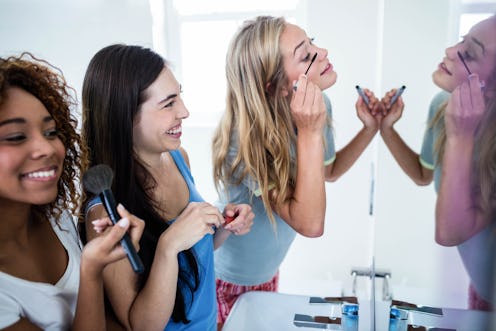Style

When you're getting ready for a big night and you've run out of mascara, it's almost natural to reach for the contents of someone else's makeup bag. But sharing beauty products can have some nasty consequences for your face and other parts of your body. I spoke to some experts to find out exactly what those consequences are.
If you're a stickler for cleaning your sponges and brushes, using another person's tools or products effectively throws all of that effort out the window. "By sharing products, you're not only not keeping them clean, you're contaminating them," says Candice Brown, a specialist skin aesthetician at the London Bridge Plastic Surgery Clinic.
In reality, you have no idea whether the person you're borrowing concealer and lipstick from is carrying any germs. It's also impossible to know what you could be passing on by letting others borrow your makeup.
As well as being mindful in personal scenarios, it's also important to watch what in-store makeup artists are using, says Pure Optical's eye and health specialist Ellen James. "They should be using a disposable wand to apply the mascara and a clean lip brush to apply lipstick," she adds.
Here's five things that can happen if you do end up sharing beauty products.
1
Unwanted Germs
“People can be a bit blasé about using other people’s beauty products, in a way they probably wouldn’t be about using someone else’s toothbrush," states Dr. Anjali Mahto of the British Association of Dermatologists. Too true. "However," she adds, "you are running the risk of sharing more than you bargained for."
Notably, this includes dead skin cells and, even more worryingly, germs. Per the Independent, cold and flu germs can live in makeup along with other easily spreadable illnesses.
2
Bacterial Skin Infections
Harmful bacteria can be transferred via makeup brushes and products themselves, potentially leading to a noticeable reaction on your skin. "If you have to buy beauty products in jars, then don’t just put your fingers in to take out [the] product — and certainly never let anyone else," advises Sharon Hilditch MBE, founder of Crystal Clear Skincare. Instead, she recommends use a wooden spatula or lollipop stick to scoop out creams and lotions.
The only way to safely share creams, notes Lucy Xu, skin specialist and owner of London Premier Laser Clinics, is to buy a tube version, "so they can be dispensed onto the back of a hand to ensure no potential bad bacteria reaches the product."
One infection to be particularly aware of is a staph infection. Often caused by a bacterium called staphylococcus, it is "usually minor," says Dr. Mahto. But what tends to be a boil-type inflammation can sometimes "be very serious." It is also easily spread so if it looks to be getting worse or is still present after a week, you may require a course of antibiotics from your GP.
3
Breakouts
One of the most obvious reasons not to share makeup, brushes, or skincare, breakouts are often caused by the Propionibacterium acnes (P. acnes) bacteria which, notes Xu, is itself promoted by the transference of oil and dirt.
"Even if you don't normally have acne or spots, sharing products can cause you to suffer a breakout and develop whiteheads, blackheads, pimples, or cysts," says Brown. "And depending on what type of products are being shared, these are likely to appear on a person's face, neck, chest, back, and shoulders."
4
Eye Infections
"Never share a friend's mascara, no matter how much you love it," states Hilditch. James backs this point up, explaining that eyes are not protected in the same way as skin. "Therefore, eye infections can rapidly occur with ease," she continues.
"Our lashes naturally contain bacteria that is transferred onto the mascara wand as the product is applied. This bacterium is then transferred into the tube along with air that has been trapped as you push the wand to the bottom of its container." According to James, this is the "perfect environment" for bacteria to cause an eye infection.
Eye infections can take the form of pink eye, sties, and conjunctivitis. All are contagious, says James, "so it is likely that everyone who shared the mascara will suffer." Liquid eyeliners can promote the same response, so stick to a pencil one that can be sharpened and sterilised by dipping in alcohol.
5
Cold Sores
Lip products, including lipsticks, balms, and salves, can lead to cold sores, says Xu, "even if the person you're borrowing [from] doesn't appear to have any cold sores on their lips at that time."
A person may unknowingly be carrying the cold sore virus, also known as the herpes simplex virus, adds Brown. "And once you have the virus, you're at risk of developing cold sores for the rest of your life." Cold sores can even affect the eyes, according to James.
6
When it comes to beauty, the consensus from every expert is that sharing is not caring. So avoid giving and borrowing wherever you can, and don't forget to keep your tools clean.